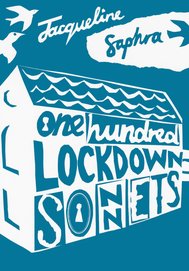REVIEW: JACQUELINE SAPHRA’S ‘ONE HUNDRED LOCKDOWN SONNETS’
Reviewed by Stella Backhouse

“April is the cruellest month, breeding/Lilacs out of the dead land, mixing/Memory and desire, stirring/Dull roots with spring rain.” It’s funny how you forget. If I have any memories of it now, that month, April 2020, it’s the cruelty of its juxtapositions: the UK death toll rearing upwards to a thousand-plus a day; the desperate, pleaded injunctions to stay home; and all the while, just beyond the window, the blossoms – basking in the most glorious spring anyone could remember.
I make no apologies for quoting T S Eliot’s masterpiece The Waste Land in a review of Jacqueline Saphra’s One Hundred Lockdown Sonnets. The turns of phrase, the London settings, the incidental surrealism and the now-aftermath of epochal events – all of them put me in mind of Eliot. Nervous readers should not, however, be put off. Unlike the famously ‘difficult’ Waste Land, Saphra’s collection is accessible and relatable. We all lived through lockdown. We all shared the experience. Like most successful poetry, this taps into what we already know; its magic is to take the vague and groping, and snap it into clarity.
It’s a collection that does what it says on the tin. Saphra started writing lockdown-inspired sonnets on March 23rd 2020, the day the first lockdown began, and continued writing one a day until 30th June, making a hundred in total. As a strategy, this writing-in-action approach (comparable perhaps to Ali Smith’s Seasonal Quartet) necessitates fearsome discipline and is very high-risk: you don’t know, for example, whether the themes you identified as important at the start will maintain their relevance as the crisis evolves. But Saphra has a masterstroke up her sleeve: her unwavering faith in the sonnet as the ideal form to convey not just the physical straightjacketing and intellectual introspection imposed by lockdown, but also the sense of every day the same/every day different.
The result is something like a patchwork quilt made from squares of fabric that are all the same size but printed with different patterns. Saphra’s daily inspirations range from news stories – sometimes frivolous, usually serious – to unexpected joys, personal catastrophes (needing a dentist in lockdown) and ‘new normal’ mundanities like the ubiquitous Zoom. She meditates on the disorientating effects of broken time; mourns the loss of ‘before’; rages; sheds tears; celebrates her ability to carry on. Part of that ability is down to poetry itself.
In the introduction, Saphra says sonnet-writing “[gave] shape to the unshapeable…giving me a boundaried form to chart my own internal journey as well as external events.” More generally, the collection is a masterclass in how poetry shapes and contributes to our understanding of the world. Saphra does this by posing direct questions: “Yeah poetry. Ha ha! What use is that?/ The sky is falling! All I do is howl/and hawk inside this hopeless shell of doom” (Sonnet 25) but also by demonstrating how poetry unites us by prodding at what we know but don’t say: “Remember how you wished the world would change?/Remember when the trains were just the trains?” (Sonnet 49).
Combined with the popularity of sonnets, its shared experience subject-matter gives this collection broad appeal. It could be criticised for its London centric-ness, its default middle-class-ness (sourdough makes frequent appearances) and its occasionally idiosyncratic inspirations – a poem about billionaire investor Warren Buffett for example, but nothing on the apocalypse unfolding in Britain’s care homes – but its chances of becoming an instant classic probably depend on readers’ appetite for re-visiting lockdown. It could be a while before we’re ready.
When we are though, what we might find is a dress-rehearsal for worse to come. If there is a theme running through this, it’s our capacity for self-delusion. Our insatiable greed and our inability to respect nature. Our hiding from reality, our clueless leaders’ mission to distract us from it and our willingness to be distracted. Poetry itself colludes: “why feel the real when I can touch the page/and angst over artistic transience?” (Sonnet 7). But the truth can’t be avoided for ever: “In this deluded age, the leading role/is ours, we think. Nah. We’re just the cameo./ Death takes the curtain call and steals the show.” (Sonnet 50). “So many,” said Eliot. “I had not thought death had undone so many.”
Jacqueline Saphra’s One Hundred Lockdown Sonnets is available for purchase online from the Nine Arches Press website.
